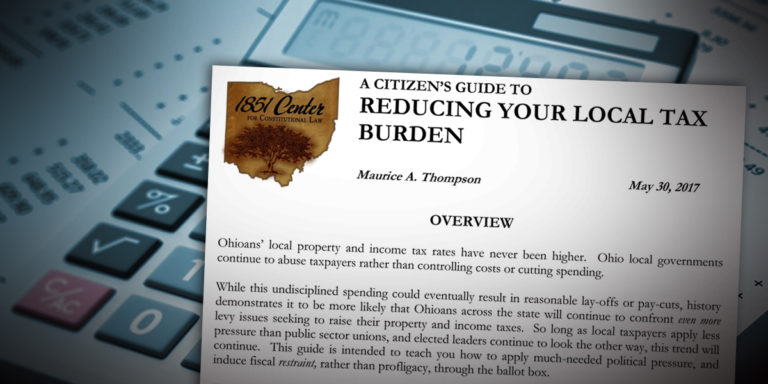U.S. Supreme Court Petitioned to Review Ohio PAC Laws
1851 Center asks United States Supreme Court to review Ohio Political Action Committee regulations on behalf of Geauga County blogger’s First Amendment rights
Columbus, OH – The 1851 Center for Constitutional Law, in cooperation with the Washington D.C.-based Center for Competitive Politics, late yesterday petitioned the United States Supreme Court to weigh in on the nation’s strictest Political Action Committee regulations.
The legal action is filed on behalf of Edmund Corsi, a Cleveland-area blogger who faces prosecution after blogging about state and local political issues, authoring a pamphlet critical of local politicians, and hosting an informal political discussion group. The state contends that Ohio’s PAC laws required Mr. Corsi and others, known as “Geauga Constitutional Council,” to first register with the state and hire a treasurer, and then disclose his home address on his pamphlet and blog, and that by failing to do so, Corsi is subject to criminal penalties and civil fines. Mr. Corsi was referred for prosecution by one of the politicians he criticized – – Geauga County Republican Party chairman Edward Ryder.
The United States Supreme Court has repeatedly confirmed that political speech, even when through group association, in pamphlets or on the internet, is afforded the greatest constitutional protection.
The Court has already once struck down Ohio’s Political Action Committee regulation, in McIntyre v. Ohio Elections Commission in 1995. There, the Court chastised the Ohio Supreme Court and the OEC for upholding the regulations after state officials attempted to prosecute a senior citizen for failing to include a “disclaimer” on her homemade flyer advocating against a local tax increase.
Nevertheless, the Ohio Elections Commission maintains that the re-written regulations still require groups of two or more Ohioans who communicate political thoughts to first register as a Political Action Committee, and thereby submit to reporting, disclaimer, and disclosure requirements. Ohio Courts applied no scrutiny to the OEC, and the Ohio Supreme Court voted 4-3 to sidestep the issue.
This case presents the first opportunity for a federal court to analyze application of the re-written PAC regulations, as well as the first opportunity to consider the effect of the Court’s landmark Citizens United decision on Ohio’s campaign finance regulations.
The Petition for Certiorari presents the following legal questions to the Court:
- May the major purpose test for political committee status, established by this Court in Buckley v. Valeo and FEC v. Mass. Citizens for Life, be satisfied without finding that regulated activity comprises the majority of an organization’s activity or expenditures?
- May a state meet its burden of demonstrating an organization’s major purpose without determining the portion of its expenditures directed toward political communications?
In addressing these issues, the Petition explains:
- The costs of complying with the PAC regulations, which includes reporting and disclaimer requirements, administrative burdens, the hiring of a treasurer, and the loss of privacy and anonymity of those who speak out by effectively requiring the disclose of the author’s name and home address on government filing, has the effect of silencing protected speech.
- The Ohio Elections Commission members improperly guess at the “primary or major purpose” of the group, without considering whether they have spent money on politics, how much money, or other non-campaign-related activities.
- In involuntarily committing groups of citizens not primarily engaged in elections as PACs, the OEC improperly overanalyzes isolated Facebook and blogs posts and informal “mission statements.”
“Ohio’s PAC regulations have long been considered the most oppressive in the nation, and the Ohio Elections Commission’s application of those regulations has rightfully been the source of national criticism” said Maurice Thompson, Executive Director of the 1851 Center. “Meanwhile, Ohio courts, including our highest court, continue to make high-profile mistakes and oversights on basic First Amendment doctrine, requiring Ohioans to look to federal courts to protect their rights. The First Amendment does not allow politically-appointed OEC bureaucrats and political opponents to use PAC regulations to silence the speech of those who criticize government, using the loss of privacy and expensive reporting requirements of PAC regulations as leverage to intimidate and threaten those expressing differing views, as has been done here.”
Thompson added, “While many Americans fret over government permitting speech by ‘super-PACs,’ they should be more concerned about shocking amount of everyday grass-roots political speech that Ohio is forcing into PAC status – from lawn signs to Facebook pages – and thus essentially prohibiting, at the very same time.”
The case is particularly significant for opponents of local tax levies and “tea party” groups, many of whom are likely to be characterized as Political Action Committees, if the Ohio Election Commission’s ruling is not eventually overturned.

Read The Geauga Constitutional Council’s Petition for Certiorari here.

September 10, 2013: The Plain Dealer: Edmund Corsi’s political blog and activism that triggered Ohio election complaint now sits before U.S. Supreme Court
September 6, 2013: Wall Street Journal: Bradley Smith: The Supreme Court and Ed Corsi’s Life of Political Crime
July 11, 2013: Forbes: In Today’s America, Consult Your Attorney Before Speaking Freely












Leave a Reply
Want to join the discussion?Feel free to contribute!